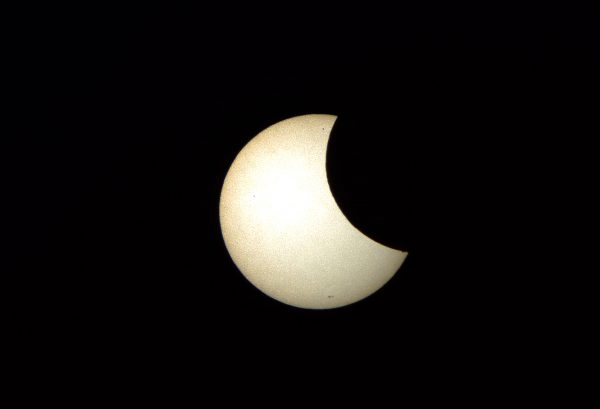Hundreds of residents in a Western Australian town will be allowed to offer accommodation to visitors for a total solar eclipse scheduled for next year in 2023.
Exmouth, a small town in WA’s north with a population of about 2,000, will be one of the best viewing spots in the world for the Ningaloo Eclipse on April 20, 2023, which is expected to attract over 20,000 visitors.
A total solar eclipse occurs when the moon passes between the Earth and the Sun, completely blocking the Sun’s rays. While solar eclipses occur at least twice a year, total solar eclipses are rare, according to the Sydney Observatory.
“This event is rarely visible from a large city like Sydney because large cities are less likely to be in the direct line of the eclipse,” Sydney Observatory said on its website.
“This is simply because there are many more smaller towns than there are larger cities.”
Observers in some other areas of Australia will be only able to see a partial eclipse.
 Parliament of Western Australia in Perth, Australia on Dec. 2, 2020. (AAP Image/Richard Wainwright)
Parliament of Western Australia in Perth, Australia on Dec. 2, 2020. (AAP Image/Richard Wainwright)“This includes Perth, which will witness a 70 percent eclipse, Coral Bay will experience a 99 percent partial eclipse while Geraldton will see just over 80 percent,” the WA government said.
WA’s Labor government plans to use its unique geographical location for the solar eclipse to generate revenue for the local economy, benefiting local residents and tourists.
The government said in a statement on Aug. 26 that it had decided to change local planning laws to allow about 600 private property owners to provide accommodation and camping.
“Not only will these changes ensure we’re able to accommodate for the thousands of expected visitors, they’ll allow private landowners the opportunity to benefit from this unique tourism opportunity,” Planning Minister Rita Saffioti said.
Interpretations of Solar Eclipse in Different Cultures
While 20,000 visitors are expected to travel to WA to view the solar eclipse, with astronomers worldwide travelling long distances to record the natural phenomenon, indigenous cultures regarded the event differently in ancient times.
In the Aboriginal cultures of eastern Australia, for example, a solar eclipse is viewed as a bad omen, with folktales warning about the occurrence.
In the Euahlayi indigenous clans of northern New South Wales, for example, they believe that the Sun is a woman named Yhi who falls in love with the moo,n a man named Bahloo.
However, Bahloo has no interest in Yhi and constantly tries to avoid her, leading Yhi to chase him and tell the spirits who hold the sky up that if they let Bahloo escape, she will cast down the spirits, and the sky-world will fall, dragging the world into everlasting darkness.
“To combat this omen of evil, the people employ a brave and well-respected member of the community, such as a Clever Man, to fight the evil of the eclipse,” according to Australian Indigenous Astronomy. “This includes throwing sacred objects at the Sun whilst chanting a particular song or set of words.”
 A focused image onto a white background through a telescope shows the moon crossing in front of the Sun as seen from the Sydney Observatory on May 10, 2013. (Saeed Khan/AFP/Getty Images)
A focused image onto a white background through a telescope shows the moon crossing in front of the Sun as seen from the Sydney Observatory on May 10, 2013. (Saeed Khan/AFP/Getty Images)In some Native American cultures, the moon’s passing over the Sun is a reborn moment for the Sun, and tribal members will take time out for themselves.
“It’s a time of renewal,” said Baldwin, a Navajo woman from Fort Defiance, Arizona. “Kind of like pressing the alt, control, delete button on your computer, resetting everything.”
In some other cultures, solar eclipses can be an omen of impending disaster.
In ancient China, for example, the ancient Chinese believed that a total solar eclipse relates singularly to the wrongdoings of the Emperor or ruler of the land. This is because, in Chinese tradition, the sky represents cosmic changes, and the Sun has the most exalted position in the celestial body.
Eclipses Were also Regarded as Messages From Heaven
In imperial China, the populace believed that the Emperor’s right to govern was legitimised by the mandate from Heaven, hence the imperial title Son of Heaven, which meant that the Emperor was sent by Heaven to govern the people.
 A virtuous emperor prays to Heaven with a sincere heart. The ancient Chinese believed that the will of Heaven was to protect people from suffering and disaster and that kings had been sent as their human agents to see to this task. (Catherin Chang/Epoch Times)
A virtuous emperor prays to Heaven with a sincere heart. The ancient Chinese believed that the will of Heaven was to protect people from suffering and disaster and that kings had been sent as their human agents to see to this task. (Catherin Chang/Epoch Times)Since, figuratively Heaven represented the Emperor’s father in this philosophy, the Chinese would use phenomena related to the Sun to warn the Emperor, its earthly agent, of what he had done wrong, with solar eclipses usually interpreted as a warning for the Emperor.
For instance, the Book of the Later Han records that during Emperor Huan’s reign in the Han dynasty, a solar eclipse occurred, and the Emperor issued a proclamation to show his fear of Heaven’s punishment and repent for all his wrongdoings. He also ordered those who had been sent to the border area because of their crimes to return to their hometowns as an illustration of the benevolence with which he intended to rule.
 RSS Feed
RSS Feed















 August 29th, 2022
August 29th, 2022  Awake Goy
Awake Goy  Posted in
Posted in  Tags:
Tags: 













